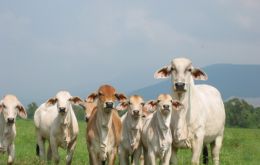MercoPress. South Atlantic News Agency
Agriculture
-
Thursday, June 9th 2011 - 04:20 UTC
FAO forecasts world food prices are likely to remain high in 2011 and 2012

Citing dwindling stocks and only small production increases for the majority of crops, a new United Nations report released Wednesday world food prices are likely to remain high for the rest of this year and into 2012.
-
Thursday, June 9th 2011 - 02:54 UTC
Pressed by outraged farmers EU increases compensation for E.coli outbreak losses

Pressed hard by outraged farmers, the European Union farm chief on Wednesday increased his offer of compensation for the E. coli outbreak to Euro210 million.
-
Wednesday, June 8th 2011 - 23:32 UTC
Brazil unveils plan and incentives to boost ethanol production

Brazil's government unveiled new financing and other incentives for sugar cane ethanol production, vowing to work closely with the private sector to boost production in an industry that has struggled recently despite its immense promise.
-
Wednesday, June 8th 2011 - 23:03 UTC
Rocketing values for cattle in Brazil anticipate ‘beef prices will remain high’

World beef prices look set to stay high long term given the rocketing prices of raising cattle in Brazil, and the lack of an obvious successor as the world's low-cost producer.
-
Thursday, June 2nd 2011 - 09:36 UTC
Argentina’s second biggest soybean producer expands in Brazil; plans shares sale

Argentina’s second- biggest soybean producer Los Grobo, plans to transfer some assets to a new company and sell shares of the business in an initial public offering in Brazil.
-
Tuesday, May 31st 2011 - 22:55 UTC
Mercosur and EU admit internal problems are delaying trade negotiations

The European Union and Mercosur admit they have internal problems that are delaying discussions, and results, for a broad association and cooperation accord that contemplates a trade agreement questioned by strong interests from both sides.
-
Tuesday, May 31st 2011 - 22:47 UTC
Brazil and Paraguay with record crops of soy beans and export volumes

Mercosur members Brazil and Paraguay harvested unprecedented soy crops this year while Argentina’s results are disappointing limiting its exports, according to the latest report form Hamburg based Oil World.
-
Thursday, May 26th 2011 - 18:27 UTC
Record rice crop in Uruguay: 1.65 million tons but farmers concern with prices

Uruguay harvested a record crop of rice this year totalling 1.65 million tons and marked the second highest area planted with the cereal, 195.000 hectares compared to the 200.000 of eleven years ago.
-
Saturday, May 21st 2011 - 09:14 UTC
US processor building 180.000 tons storage grain terminal in Uruguay

US agricultural processor Archer Daniels Midland Co said this week it was building a grain export terminal in Nueva Palmira, Uruguay, capable of loading large bulk shipments of corn, wheat, soybeans and soy-meal.
-
Monday, May 16th 2011 - 03:24 UTC
Sarkozy: no support for EU/Mercosur trade deal that cuts farmers’ income

French president Nicholas Sarkozy stressed over the weekend he would not accept an European Union-Mercosur trade agreement that could mean a loss of income for European farmers.